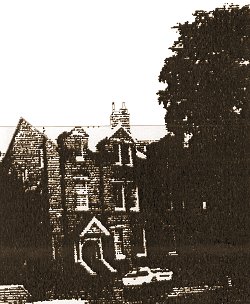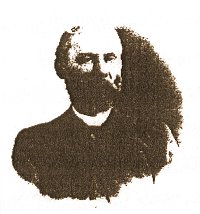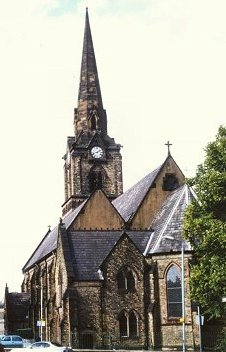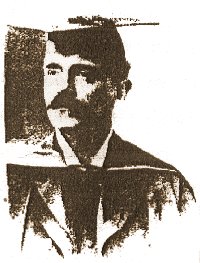|
Chapter 1. "The Footballing Parson!"
Kenneth Reginald Gunnery Hunt was born on
February 24th, 1884 at 28. Warnborough Rd. in the city of
Oxford. His father, Robert George Hunt, came from the town
of Stanley in the United States, and was the son of the
Reverend R. Hunt who was a missionary amongst the Red Indian
tribes of the North West States. Although he had spent
several years training for a position in the London Stock
Exchange, he was ordained into Holy Orders in London in
1876. He had been a priest for eight years by the time
Kenneth was born. He had gained an Honours Degree in
Humanities at Merton College, Oxford in 1879 and had been a
curate at St. Mary's Church, Hornsea Rise, near London
between 1879 and 1881. At the time of his son's birth Robert
Hunt had been seconded from mainstream Parish life to become
the "Distribution Secretary of the British and Foreign Bible
Society", a position he held until 1893. The family was
living in Oxford at the time of Kenneth's birth because
Robert had been establishing an administrative base for the
Bible Society in the town, which would cover the southern
part of the English Midlands. He also took the opportunity
whilst in Oxford to convert his Bachelor's Degree to a
"Masters".
|

| 28 Warnborough
Road, Oxford. The birthplace of Kenneth R.G. Hunt in
February 1884. |
|
After four years as Vicar of St Matthew's,
Islington, Robert moved with his wife Elizabeth, (great
grand-daughter of Thomas Scott, who was a founder of the Bible
Society); his daughters, (Hilary, Ruth, Gladys and Margaret),
and his youngest child, Kenneth, to take up the "living" at St.
Mark's Church, Chapel Ash in Wolverhampton. The family had some
knowledge and connection with the area, as Robert’s older
brother, Joseph William Hunt, was a "general medical
practitioner" in the nearby village of Tettenhall.
Kenneth Hunt's baptism on the 29th March, 1884, at the
church of St. Peter le Bailey in Oxford, was performed by
his maternal grandfather, the Reverend Reginald Gunnery who
had been the Vicar of St. Mary's, Hornsea Rise at the time
Robert Hunt had been a curate there and whose daughter he
had married. |
| Gunnery would have been a noted figure in
Anglican circles at the time, as he had been 'Secretary to the
Church of England Educational Society' between 1854 and 1861,
the period when the organisation was an important pressure group
prior to the advent of the State Educational system. In honour
of this cleric, the Hunts included both his forename and surname
in their son's naming, so rather strangely Kenneth was to bear
'Reginald' and 'Gunnery' as his middle names. |
| When Robert Hunt became the Vicar and Surrogate
of St. Mark's in Wolverhampton in 1898 the town was reaching a
milestone in its evolution as one of the most important
manufacturing centres in Britain. Indeed, only four years later
the town hosted a famous national exhibition of art and
manufacturing in the West Park, which was very close to where
the Hunts were living. Set in the then leafy suburbs of Chapel
Ash, a prosperous middle class area to the west of the town, the
living of St. Mark's seems to have been a relatively valuable
one. It was worth £400 p.a., compared with other churches in the
town's suburbs, (e.g. St. Matthew's at £320 p.a., and St. Luke's
worth a mere £275 per year). |

Robert Hunt M.A.
|
|

St. Mark's Church. |
It is very likely that Robert's early training
in the ways of the Stock Market made him a shrewd and prosperous
investor who was able to make the most of his relatively large
income.
Further evidence that the Parish was large and prosperous
can be gauged from the fact that apart from Hunt senior, two
well qualified curates were employed to tend to the St.
Mark's Church parishioners' spiritual needs, and St. Mark's
had to establish a 'daughter' church in Humber Rd., to serve
the western part of the parish. The parish also boasted two
schools at the turn of the century; one in Chapel Ash for
boys and a corresponding girls and infants' school in Humber
Rd., although there is no evidence that Kenneth Hunt
attended St. Mark's school. Indeed, his parents were willing
to spend part of their income on their son's education at
Public schools. When his family moved into the town in 1898,
Kenneth Hunt would have been about fourteen years old, and
so would have been of the required age to cease legally
compulsory education. |
| However, unlike the majority of children at
this time, his education did not then end, as he was enrolled
into Wolverhampton Boys Grammar School, which was a mere half
mile from St. Mark's Vicarage. During his time at the Grammar
School, Hunt was taught by J. H. Hichens, MA, the Headmaster.
Records on Hunt at Queen's College, Oxford, note that Hichens
was in Holy Orders, but local sources do not substantiate this.
What is interesting is that Hichens was an ex-Queen's man
himself and a probable influence on Kenneth Hunt's eventual
choice of College. Kenneth Hunt remained at the Grammar School
for three years, (1898-1901). With fees set at a not
inconsiderable level of £4.10 shillings a term, it was at the
Grammar School where Kenneth's sporting prowess was first
noticed and developed. Physical Education at the school was
organised by a former Non-Commissioned Officer and Boer War
veteran from the Staffordshire Regiment by the name of Patey. |
| Under the title 'Sergeant-Instructor' one might
well imagine that Patey's idea of physical exercise would have
been all 'bull and square-bashing', and-undoubtedly there would
have been elements of this. However while it is worth noting the
emphasis the British Army had put on the physical fitness of
individuals in the latter years of the nineteenth century,
Hunt's involvement in team sports is likely to have been more in
the remit of the Public School ethos, evident at the Grammar
School. It didn't take long for young Kenneth to make his mark
on the sporting scene at the school. Within a few months he had
become a member of the football team, and by 1900 held the
position of Captain. In his first season in the school team he
was described as being "a very promising half, playing with more
head than some of his seniors. Kicks and tackles well, and
sticks to his man". |

J. H. Hichen M.A.
|
|
There can be little doubt that Hunt was
developing into what now might be called a 'physical
player'.
In those days when the rules of the game were still
developing, the use of the 'shoulder charge' was very much a
feature of soccer, and Hunt, who was to grow to over six
feet in height, was not averse to using the tactic. However,
the sportsmanship of the young man was strong and his
"energetic and spirited" leadership had a significant effect
on the school team. In the Easter term of 1901 the First
Eleven won all of their seven matches, completing their
season with a 15-0 whitewash of' G.B.H. Greening Esq.'s XI'
Hunt involved himself in other aspects of
school life. He was a member of the cricket team, and was a
fairly good, although inconsistent, opening batsman. He also
acted as an emergency bowler, but only seems to have been
used when the more regular bowlers needed a breather. Hunt
edited the school magazine in his final year, but showed a
great deal of modesty when describing his own part in the
school's footballing successes. As well as this, Hunt helped
the Masters organise the school sports days and was an
accredited member of the Games Committee.
Generally speaking, Kenneth Hunt was not
the most dedicated of pupils. His education seems to have
been based mainly on classical subjects. Although it is
recorded that he won copies of Shakespeare and Longfellow
for prowess in Latin when he first entered the school, by
the time he took his Senior Exams four years later he merely
'satisfied the examiner'; this being the lowest pass grade
possible. Perhaps too much time had been dedicated to the
field of sport, and not enough to books!
Shortly after the Christmas of 1902
Kenneth Hunt left Wolverhampton Grammar School and became a
boarder at Trent College, in Long Eaton, Derbyshire. It
cannot be ascertained why it was decided that Kenneth should
not conclude his pre- University education in Wolverhampton,
but it is very likely that his parents' and his own choice
would have been strongly influenced by the fact that the
College was an Anglican foundation.
|

|

|
Return
to
the contents |
Proceed
to
Chapter 2 |
|